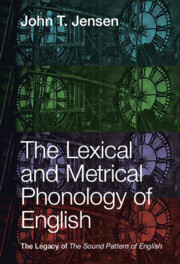Book contents
- The Lexical and Metrical Phonology of English
- The Lexical and Metrical Phonology of English
- Copyright page
- Contents
- Figures
- Preface
- Chapter 1 Theories of Phonology
- Chapter 2 Segmental Phonology
- Chapter 3 Syllables and Moras
- Chapter 4 English Stress
- Chapter 5 Prosodic Phonology
- Chapter 6 Lexical Phonology: The Cyclic Rules
- Chapter 7 Word-Level Phonology
- Chapter 8 Further Issues in Phonological Theory
- References
- Index
Chapter 8 - Further Issues in Phonological Theory
Published online by Cambridge University Press: 18 June 2022
- The Lexical and Metrical Phonology of English
- The Lexical and Metrical Phonology of English
- Copyright page
- Contents
- Figures
- Preface
- Chapter 1 Theories of Phonology
- Chapter 2 Segmental Phonology
- Chapter 3 Syllables and Moras
- Chapter 4 English Stress
- Chapter 5 Prosodic Phonology
- Chapter 6 Lexical Phonology: The Cyclic Rules
- Chapter 7 Word-Level Phonology
- Chapter 8 Further Issues in Phonological Theory
- References
- Index
Summary
Umlaut and ablaut as morphological (rather than phonological) processes, affix order and bracketing paradoxes, subcategorization and stratum ordering, critique of Optimality Theory with respect to its ability to account for major phonological patterns in English, as described in rule terms in the preceding chapters. These include stress, vowel shift, and laxing. Special attention is given to opacity. Opacity presents the same problem to Optimality Theory as it does to pre-Generative structuralist phonology, due to its output orientation. Velar Softening is opaque in medicate (underapplication) and in criticize (overapplication). Various patches proposed to deal with this issue have involved the reintroduction of the intermediate derivational stages that Optimality Theory was designed to eliminate. These patches do not allow for Duke of York derivations such as that which appears in English in the derivation of pressure. The device of stratal Optimality Theory, combining level ordering and constraints differently ranked on different strata, can account for some Duke of York derivations but at the expense of making some postlexical processes lexical.
Keywords
- Type
- Chapter
- Information
- The Lexical and Metrical Phonology of EnglishThe Legacy of the Sound Pattern of English, pp. 317 - 365Publisher: Cambridge University PressPrint publication year: 2022



